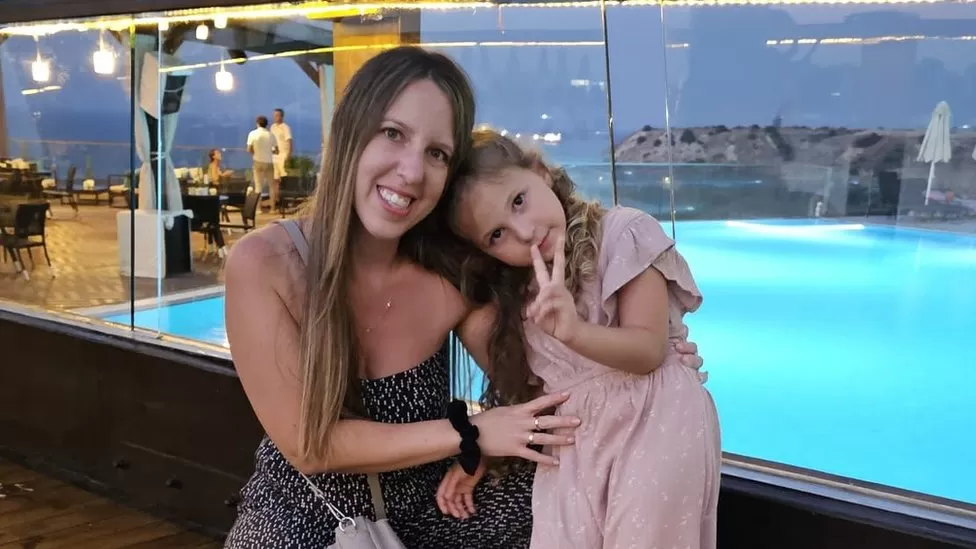
In the garden of his home in central Israel, amid the palm trees dappled in the morning sun, Yoni Asher shows me a video on his phone.
It’s of his two small girls, sitting on a bed. They’re singing Happy Birthday.
Raz, the eldest, with long fair hair, is just four years old. Her sister Aviv, darker and more like her dad, is only two.
“They made this for my birthday in July,” Yoni tells me.
But four months on, the 37-year-old father and husband is home alone.
Along with their mother Doron, they were captured on 7 October in Hamas’s unprecedented cross border attack. They are thought to be among the youngest of the 240 hostages being held in Gaza.
“They had been visiting their grandma for the holidays in Nir Oz,” Yoni says.
The Israeli kibbutz sits only two miles from Gaza. It was one of the communities worst affected by the attack, with one in four of those who lived there believed to have been killed or kidnapped by Hamas.

Yoni was not with his family that day. He’d stayed home for work, a hundred miles away.
The first confirmation his family had been abducted by Hamas came in a video, posted on TikTok from inside Gaza. Yoni shows it to me.
In the five-second clip, you can see his wife Doron, still in her nightwear crammed onto a motorised cart surrounded by Hamas gunmen.
Raz is there in a pink summer dress.
“That’s Aviv’s hand,” Yoni says, pointing to five tiny fingers, reaching out towards her mother.
That was more than three weeks ago. Yoni has not seen or heard of his family since. Their grandma, Efrat Katz, has been found dead. Her partner, Gadi Mozes, also abducted, is missing.
“The only way to describe it is hell,” says Yoni. “It’s the definition of hell.”
“How can I eat when I don’t know what my family are eating? How can I sleep when I don’t know if they if they are cold or too hot?”
“As a father, if you ever saw your children jumping on the bed, or the sofa, you worry they will fall on their head. So, imagine how I feel in this situation. Everything is frightening to me.”
For now, all Yoni has are memories. And inside the family home, they are everywhere. Photographs and children’s artwork on the wall. Tiny handprints in red paint.
“They loved to draw. Raz did this one for me,” says Yoni, pointing to a cartoon-like figure on a pin board that’s meant to look like him.
“She told me it’s a superhero.”

There’s the familiar toy kitchen.
“They always liked to pretend to cook for me.”
Yoni goes on.
A collection of tiny shoes is lined up in the corner amid children’s books.
“I had to take all the batteries out of the noisy toys,” he says.
“They are tiny balls of energy. With three women in the house, we had enough noise for any man,” Yoni tells me managing to raise a smile.
I ask him how he feels about the suffering in Gaza, now under Israeli bombardment for almost a month and where the United Nations says thousands of children have been killed or injured.
“Children are children, it doesn’t matter which country they are from,” he says.
“Children need to be off limits. I can’t hate not even the children of my so-called enemies. How can you hate a child?”
And what about the hostage videos that have been released by Hamas?
“It was not easy to watch,” Yoni replies.

“They’re the ones who got kidnapped. They [Hamas] are taking advantage [of] them in a cynical and the lowest way possible, in order to make some kind of psychological battle.”
At 37 years old, Yoni has known the conflict between the Israelis and Palestinians his entire life. His parents knew it before him.
But for him, 7 October is obviously the worst moment.
“It’s one day of Holocaust,” he tells me, as he pauses to choose his words.
“I know it’s a harsh word. But that day was the worst that was seen in the history of the Jewish people and the Israeli people.”
Does he think Israel can ever get over its collective trauma?
“We have no other choice. It’s like my own personal case. It’s either fight or be dropped,” he says.
“We have to recover. It will be very difficult. But I believe in the long term, our nation will recover.”
For now though, all Yoni can do is wait, hope and tell his family’s story.

